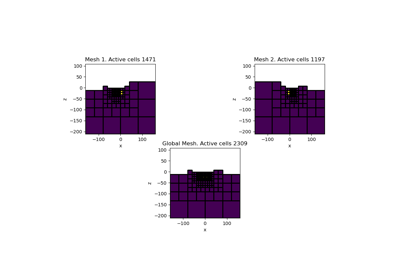simpeg.maps.TileMap#
- class simpeg.maps.TileMap(global_mesh, global_active, local_mesh, tol=1e-08, components=1, **kwargs)[source]#
Bases:
IdentityMapMapping for tiled inversion.
Uses volume averaging to map a model defined on a global mesh to the local mesh. Everycell in the local mesh must also be in the global mesh.
- Parameters:
- global_mesh
discretize.TreeMesh Global TreeMesh defining the entire domain.
- global_active
numpy.ndarrayofbool orint Defines the active cells in the global mesh.
- local_mesh
discretize.TreeMesh Local TreeMesh for the simulation.
- tol
float,optional Tolerance to avoid zero division
- components
int,optional Number of components in the model. E.g. a vector model in 3D would have 3 components.
- global_mesh
Attributes
Set the projection matrix with partial volumes
Number of components in the model.
Defines the active cells in the global mesh.
Global TreeMesh defining the entire domain.
Determine whether or not this mapping is a linear operation.
This is the local_active of the global_active used in the global problem.
Local TreeMesh defining the local domain.
The mesh used for the mapping
Number of parameters the mapping acts on.
Shape of the matrix operation (number of indices x nP)
Tolerance to avoid zero division.
Methods
deriv(m[, v])dot(map1)Multiply two mappings to create a
simpeg.maps.ComboMap.inverse(D)The transform inverse is not implemented.
test([m, num, random_seed])Derivative test for the mapping.

